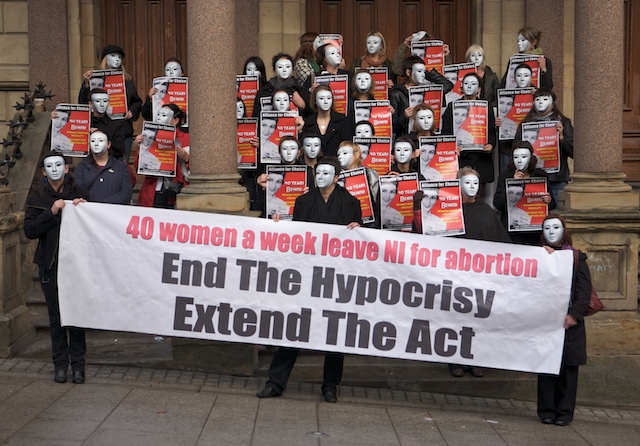On November 30th, 2015 the Belfast High Court made what could become a landmark ruling on Northern Ireland’s abortion law. The court found that Northern Ireland’s legal regime was in breach of Article 8 of the European Convention on Human Rights (ECHR) by failing to provide exceptions to the blanket ban on abortion. Though the decision will be appealed this June, it underlines the urgent need for reform both north and south of the border. The decision is important not only for its attempt to force change on an issue that Stormont has vehemently refused to move on, but also for its critique of the reasoning and logic of the current legal regime in the Republic of Ireland.
Mr Justice Horner, sitting in the Belfast High Court, made it clear that no right to abortion existed in Northern Ireland. However, the court did rule that the legal regime on abortion was in breach of the ECHR for failing to provide exceptions to the general prohibition on abortion in cases of fatal foetal abnormality (at any time during the pregnancy) and where pregnancy is a consequence of rape or incest (up to the date when the foetus becomes capable of existing independently of the mother). If the legislation can’t be read in a compliant way, then the court could make a declaration of incompatibility, meaning that Northern Ireland’s abortion regime would stand at odds to the United Kingdom’s human rights obligations.
Given the near outright refusal of many of Ireland’s mainstream political parties to substantively address the abortion issue, one could be forgiven for beginning to think that the problems with the eighth amendment exist only in our imagination.
I couldn’t help but feel relieved at this judgement, as it also assessed the abortion regime as it currently functions – or malfunctions – in the Republic of Ireland. Given the near outright refusal of many of Ireland’s mainstream political parties to substantively address the abortion issue, one could be forgiven for beginning to think that the problems with the eighth amendment exist only in our imagination.
But let’s be clear: the hypocrisy of the current constitutional arrangement in the Republic of Ireland is reaching the point of disbelief. In fact, if we are honest, the situation entered the realm of make-believe a long time ago. To guarantee the right to life of the unborn by prohibiting legal abortion in Ireland (under pain of imprisonment for up to 14 years), while at the same time guaranteeing a woman’s right to travel to an adjacent jurisdiction to have an abortion, amounts to nothing less than an attitude of “not in our backyard”. In tackling the moral hypocrisy that characterises this state of affairs, Horner commented that “if it is morally wrong to abort a foetus in Northern Ireland, it is just as wrong morally to abort the same foetus in England”.
If preventing abortion and preserving the foetus is the ultimate goal, then it hardly makes sense to propose that someone just go and get their abortion somewhere else.
If the aim of the prohibition is to prevent abortion, this doesn’t seem to make logical sense. If preventing abortion and preserving the foetus is the ultimate goal, then it hardly makes sense to propose that someone just go and get their abortion somewhere else. For both Stormont and Leinster House, exporting the problem to another jurisdiction does little to protect the life of the unborn if that is its purpose. Rather, it sends a clear message to the 3,735 women in 2014 that travelled from the Republic to the UK for an abortion that they are second-class citizens. While we know that the current situation does not result in a reduction in the number of abortions being obtained, we do know that the current situation places these women under significant emotional stress at a time when they are in most need of support. The traumatising experience of having to travel to a foreign country at short notice to have a medical procedure that is standard practice in any modern and humane health care system is a situation which both governments should be ashamed of. The financial cost this entails means that, for the most marginalised in society, travelling to England may simply not be an option. According to Horner, this situation results in a “restriction that bites on the impoverished but not the wealthy”, leading to one law for the rich and one law for the poor.
Alongside perpetuating economic inequality, the current situation reflects a deeply rooted mistrust of a woman’s ability as an adult decision-maker. This ingrained misogyny is reflected in fears that legislating for legal abortion in Ireland would result in “abortion on demand”. However, on the 10th of February Stormont voted down proposals to relax Northern Ireland’s abortion laws to allow termination in cases of fatal foetal abnormality and sexual crime. Both this failure to relax laws and the current hazy status of the High Court ruling demonstrate the confusion and division that surround the issue of abortion laws in Ireland as a whole. And yet the recent decision of the Belfast High Court is further confirmation, if any were necessary, that the eighth amendment must be repealed. While repealing the eighth will not end the fight for women’s control over their own reproductive rights, it will bring Ireland back to reality and that is no small thing.







